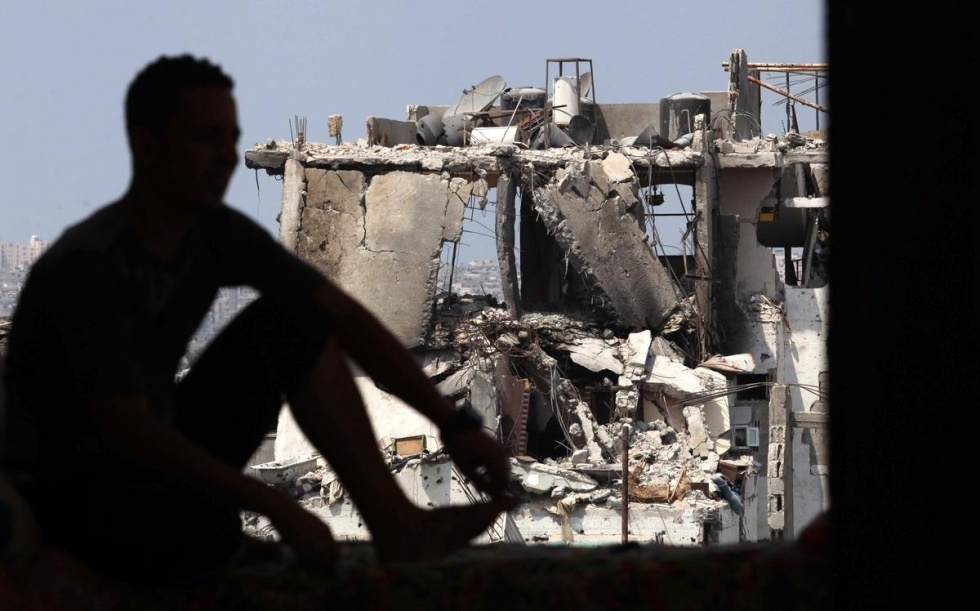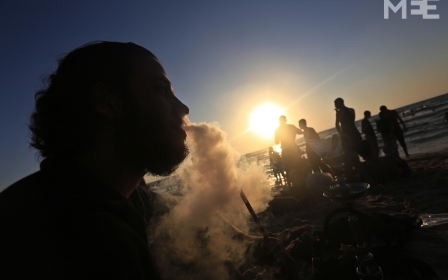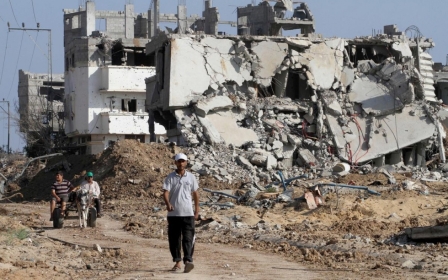International NGO: Gaza will take 20 years to rebuild

GAZA CITY - Standing in the rubble of his three shops, 20-year-old Mahmoud Nofal in Beit Hanoun said he will be in his forties before his life returns to the way it used to be before the most recent war in Gaza.
“I can’t believe it. Israel bombed the shops and home in less than 30 seconds, but now it will take 20 years to rebuild," Nofal said.
The remains of the supermarket that Nofal ran in his father's absence, including toothpaste bottles, a scattering of baby diapers, pieces of gum and smashed cans of cola, are strewn across the roads in Beit Hanoun. The goods of the three shops alone will cost $50,000 alone to replace.
All Nofal can do now, he said, is sit in a UN school where he has taken shelter and wait together with his children. At night, he sleeps in the playground of UN school, while his wife and children are crammed inside a classroom, packed with others like a sardine can. Few years ago, he was well off, but now he has no option but to rely on the canned goods and other food aid - items he used to sell in his supermarket.
Shelter Cluster, an international housing group involved in post-conflict assessment of reconstruction, agrees with Nofal's assessment: it take 20 years to re-build Gaza following the seven-week war, the group said in a report it released on Friday.
The group, whose assessment was co-chaired by the UN and the International Committee of the Red Cross, said 17,000 Gazan homes have been destroyed or severely damaged - and there are still around 5,000 homes demolished in 2008-2009 and 2012 Gaza wars that have yet to be rebuilt. In Rafah, several families whose homes were destroyed between 2003-2005 are still waiting for Saudi-funded project to be completed to return to a home.
Overall, there is a 75,000 house deficit in Gaza, according to Shelter Cluster.
The Palestinian Ministry of Housing estimates that the destruction wrought in the most recent war will cost more than $6 billion.
These are early estimates: those measuring the damage acknowledge that the scale of destruction is massive and it will take more time to have a full assessment.
Palestinian Minister of Housing Dr Mofeed Al-Hassayna, recently appointed to the Palestinian unity government, told Middle East Eye that his staff members are working hard to assess the damages in all sectors. Palestinian President Mahmoud Abbas has assigned Al-Hassayna, together with other two other ministers, to further assess the destruction to Gaza with the hope to present the findings at a future donor conference.
Norway and Egypt have jointly raised the possibility of hosting such a conference, but no details have been confirmed.
Shelter Cluster's 20-year assessment is based on the assumption that 100 trucks of construction materials will be allowed across the Kerem Shalom border crossing.
As part of the open-ended ceasefire agreement announced on Tuesday, reconstruction materials and humanitarian supplies were to be allowed into Gaza. Israel had previously restricted the import of building materials into Gaza, fearing militants would use them to build military facilities.
But so far, Gazans told Middle East Eye that they have yet to see any rebuilding material pass through the border in the past week and many who have heard the 20-year rebuilding figure are in despair.
“It is enough. We are tired," said Nasser Mohammed Al-Najjar, 62. "I lost my wife in the war. I lost my cousins and our homes have been turned into sand."
It took years for Al-Najjar to build his home and now he, and six family members, are homeless, temporarily sleeping in a UN school. Al-Najjar used to work in Israel, but since 2000 when he was laid off from work, he has tried to live off his land, which was also damaged when bulldozers break into his neighbourhood, east of Khan Younis.
“No one cares about us," he said.
In another UN school shelter in Khan Younis sits 42-year-old Rasem Abu-Zaed, 42. He had been living in Jordan for more than 15 years and working as a taxi driver which gave him enough money to feed his wife and four children. Then, Abu-Zaed decided to return to Gaza.
In Gaza, he said he has found freedom to express his views, but he has not found stability, nor security. Yet despite the knowledge that it could be 20 years before his family home is rebuilt - and that his one-year-old son, Musbah, will then be an adult - he said he does not want to return to Jordan.
“I felt something fishy the moment ceasefire was announced," he said. "I asked myself, 'Why would this work when Israel has the position of power to violate ceasefires?'"
Abu-Zaed said he and his family had heard the news from international bodies that it will take 20 years to rebuild Gaza.
"But we never heard of what they will do to challenge that," he said.
Diana Buttu, Palestinian analyst and former spokesperson for the Palestinian Liberation Organisation, told MEE that for the ceasefire to be sustained, Palestinian borders must opened, otherwise, Israel will continue a blockade on Gaza.
“The international community must ensure that Gaza is not returned to its state of being an open-air prison," Buttu said. "Palestinians must be allowed to import and export goods freely, enter and exit freely, travel to and from the West Bank freely and be given the right to open and operate an airport and seaport."
“Without ensuring these basic rights, the international community will be sending a message to Israel that it is allowed to continue its brutal, illegal blockade with impunity, and to Palestinians that statements from their governments condemning the blockade are meaningless,” she added.
While he wants to see Gaza rebuilt, Abu-Zaed said he is tired of official statements.
"Sympathy can neither feed my children, nor bring them shelter again as the winter is approaching and there is no where to go," he said. “If the international community officials wonder of what 24 hours is like for us, they should know its a year of the their lifetime.”
New MEE newsletter: Jerusalem Dispatch
Sign up to get the latest insights and analysis on Israel-Palestine, alongside Turkey Unpacked and other MEE newsletters
Middle East Eye delivers independent and unrivalled coverage and analysis of the Middle East, North Africa and beyond. To learn more about republishing this content and the associated fees, please fill out this form. More about MEE can be found here.




